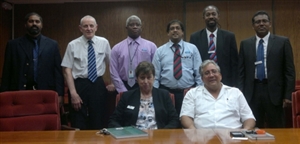
(LR: Kevin Durham (manager National Drilling Academy), Denis Marchant (IET Academic Accreditor), David Drakes (VC IET TT LN), Anthony Chadee (Chair IET TT LN), Sean Ocho (Treasurer IET TT LN), Ahmad Mohammed (PATW Co-ordinator IET TT LN))
(Seated LR: Lorna Hadfield (IET Accreditation Account Manager) and Gerald Mendes (IPRA and IET TT LN executive member)
The executive initiated the discussions by providing an overview of the LN and identifying the potential for additional accreditation services for the universities, colleges and other tertiary institutions in Trinidad and Tobago. The idea of promoting and encouraging the IET accreditation throughout the Caribbean resonated with all of the persons present at the meeting.
There were some concerns highlighted regarding the aspect of APETT (Association of Professional Engineers of Trinidad and Tobago) becoming a competing entity to the IET and it was noted that additional discussions were needed to fully understand their scope and strategy. Another competitor identified was the Caribbean Accreditation Council for Engineering and Technology (CACET).
This issue was also reflected in the problems that students and engineers experience when deciding whether to pursue the Chartered/Incorporated Engineer stauts or the locally recognised Registered Engineer, with the latter being provided by the Board of Engineering of Trinidad and Tobago as promoted by APETT.
Each of the members recognised a need to have professional development and the professional registrations of Chartered and Incorporated, for example, be a key driver for the students to aspire towards attending an IET accredited instution.
The LN were provided with an indepth understanding of the accreditation team and its process in reviewing academic programmes against the UK Spec criteria. Lorna Hadfield and Denis Marchant highlighted that volunteers from academics and industry review the university's programmes and make specific recommendations to the IET.
They both noted that the IET recognises the global demand for accreditation, especially given the moblity of engineers and their need to be associated with a recognised university, in terms of applying for professional registration. The problems of students not understanding the accreditation and its benefits was raised by both Sean Ocho, who was granted both his Incorporated Engineer and Chartered Manager titles, and Denis Marchant. It was noted that the UK Chartered status is a globally recognised qualification and demonstrates experience and educational competence equivalent of the masters level.
The benefits of this system were highlighted through discussions and some of the advantages were that having Chartered Engineers enable companies to be able to submit tenders for certain projects and that it made persons more employable. In addition, the use of the accreditation status as a market differentiator for universities was seen as providing a value added component in which quality was the indicator. This was seen as critical given that the term "engineer" was not copyrighted.
Denis Marchant was clear about the need to have a "best fit" for the market and that there was an opportunity for role models to provide their experiences as case studies for the students.
Chartered Engineers Anthony Chadee and David Drakes provided an account of their process to achieve the titles as an indicator of their understanding of its benefits.
Gerald Mendes, who is also an Incorporated Engineer, is responsible for guiding persons through the process, being the IPRA, provided an insight into the issues surrounding the system and the expectations of the engineers who apply
Kevin Durham, manager of the National Drilling Academy, noted the importance of this aspect and indicated his desire to have the programmes accredited by the IET and that they were designed around the UK Spec. The current focus was for the electrical based programmes.
Another key point was that of existing safety courses and whether they could be accredited to achieve the same effect as the wireman's licence for electricians.
Ahmad Mohammed noted the interest in the CITP qualification for the University of Southern Caribbean's IT programme and used this to reiterate the demand for the IET accreditation in the Caribbean.
